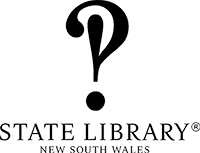Pages
FL662114
There is neither [crossed out] Nor is a form for the passive. A kind of passive is sometimes expressed by putting the object in the accusative and using the active form of the verb but the agent or instrument with whom or which the action suffered originates is not named, for that can only be put in the Nome Acce. Hence it must necessarily be inferred that the form referred to is not in reality a Passive, but an active sentence; only for the sake of laying more emphases on the Verb or action done, the Noun or agent is excepted or{crossed out] omitted
FL662116
Table of Conjugations, principal Tenses & Moods
| Present | Imperfect | Perfect | Future | Infinitive | Imperative |
|---|---|---|---|---|---|
| 1 Gannanna | Gannar | Gannan | Gungirri | Gannagi | Gannada |
| 2 Gunna | Gunnar | Gunnan | Gungirri | Gungi | Gunga |
| 3 Gumbinga | Gumbinna | Gumbinnan | Gumbigirri | Gumbigi | Gumbidga |
| 4 Baddarra | Baddae | Baddalguan | Badalgirri | Badalli | Badalla |
| 5 Gaddambirra | Gaddambir | Gaddambilguan | Gaddambilgiri | Gadambilli | Gaddambia |
| 6 Nguna | Nganar | Ngaguain | Ngagirri | Ngagi | Ngaga |
FL662118
The preceding Table contains all those Tenses in which the different configurations vary, and are on that account called Principal, or Leading Tenses. The other tenses of each configuration are conjugated according to the Model given in the full configuration of the verb "Bumarra." It is a matter of sense that not every verb is used in all the tenses; thus "Gannal" the Imperfect is not used. Certain configurations of letters may occasionally, but rarely, call for an exception from the general rules for the sake of euphony, thus, "Mugana" in the Perfect Tense is not as might be expected Mugagnan but Mugaiguan, no doubt of two "gs" being so near each other.
FL662120
Modifications As a characteristic feature, and peculiarity of the Aboriginal language must be noticed the numerous Post fixes. By means of these as we have observed the noun receives an unusual number of cases supplying in a certain measure the absence of the preposition. In a similar manner the verb receives additions or changes of its forms by which new forms it [original text deleted] [original text deleted] [original text deleted] [original text deleted] [original text deleted] Besides adverbial significations, various relations to which the simple verb may be placed are implied in these modified Verbs.
FL662122
Modifications of verbs are not altogether a new thing peculiar to this language for not only are they found in the Aboriginal Dialect of this part of the World, slight traces of them may be discovered in European & Asiatic well known to Philologists as in the Hebrew and even in the Latin: for inst: the [indecipherable] as agito from agere). but in the language they are more extensive and in there signification more uncommon - [original text deleted] [original text deleted] they tend to enrich the language considerably since the modified ideas implied in them often produce quite a new kind of word or [original text deleted] signification. As new forms of verbs they may be adjusted, according to some or other of the examples previously given agruably to their terminations Hence they can never be supposed to be merely conjugations.







